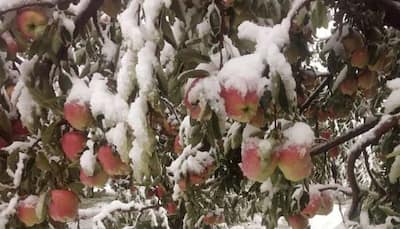The recent calls to boycott Turkish products in India have ignited hope among apple growers in Kashmir, who have long struggled against an influx of cheap apple imports from Turkey and Iran. Kashmir’s horticulture industry, particularly its apple farmers, has warmly welcomed the decision to restrict Turkish produce in India. They anticipate that the boycott, which includes Turkish apples, will lead to better prices for Kashmiri apples across the country.
India’s decision to boycott Turkey stems from Turkey’s support for Pakistan following a terror attack in Kashmir and India’s military response, Operation Sindoor. As a sign of protest, consumers across India are now opting not to purchase Turkish products, including apples. This shift has given Kashmiri apple traders optimism, as they believe their apples will see a 10-15% price advantage, becoming the preferred choice for Indian consumers.
Bashir Ahmad, President of the Kashmir Fruit Association, stated, “Cheap Turkish apples significantly impacted our produce, driving down rates, especially compared to US apples. This caused substantial losses to our industry. If the Indian trade body decides to boycott them, it will greatly benefit our horticulture sector, and we expect good prices. Turkish apples resembled ours, and people favoured them as a foreign product, similar to Iranian apples. If Turkish apples are out of the market, our apples will sell.”
For the past five years, farmers in Kashmir and Himachal Pradesh have faced challenges due to inexpensive apple imports from Turkey and Iran. Last year, 23% of India’s apple imports originated from Turkey. This made it difficult for Kashmiri farmers to secure fair prices, as imported apples were cheaper and had created a demand for foreign produce. However, the boycott of Turkish apples presents a renewed sense of hope for Kashmiri apple traders.
Shakir, an apple trader, remarked, “This will greatly benefit us. People here prefer imported apples, but once that stops, they will buy Kashmiri apples. Our rates will increase. We are happy; our apples will move forward.”
Kashmir alone produces 22 lakh metric tons of apples, while Himachal Pradesh contributes 6 lakh metric tons. Kashmir, being the largest apple producer, contributes 15% to Jammu and Kashmir’s GDP growth. Despite the significant losses faced by farmers in these states due to cheap imports in recent years, farmers now believe that this boycott will not only support them but also strengthen the economy of Jammu and Kashmir.
Rashid Rahil, a horticulture expert, commented, “The Government of India’s decision to ban Turkish products will not only boost ‘Make in India’ products but also benefit the valley’s fruit growers. At least 7-8 lakh apple producers will gain from this.”
In recent days, fruit markets in Delhi, Mumbai, Lucknow, Bangalore, Hyderabad, and many other cities have ceased selling Turkish apples. Buyers are now specifically requesting Indian Apples, offering farmers hope for improved prices this year. More than 7 lakh families in Kashmir and 2 lakh in Himachal Pradesh depend on apple farming for their livelihood. This industry not only supports apple traders but also provides jobs to lakhs of people involved in transport, cold storage, packaging, and labor.
Bashir Ahmad reiterated, “100% of people in Kashmir are directly or indirectly dependent on this industry, and around 7 lakh families are linked to this trade. It contributes 15% to our GDP, and we also provide jobs to lakhs of people directly or indirectly. It is the backbone of our economy.”
Experts predict that if Kashmiri apples sell better this year, it could generate thousands of crores in additional income for farmers and related businesses, providing a tremendous boost to Kashmir’s economy.
Stay informed on all the , real-time updates, and follow all the important headlines in and on Zee News.








